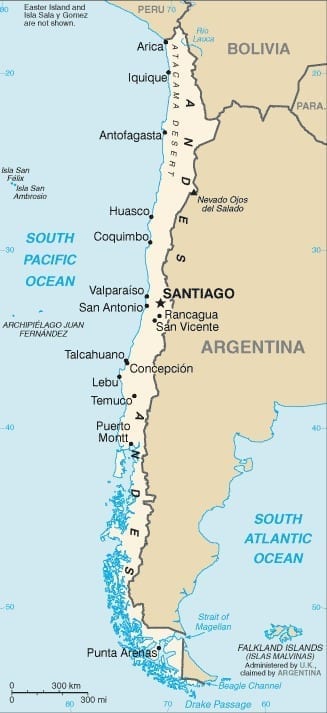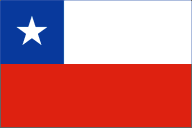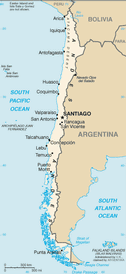Full Name: Republic of Chile
National Symbol: Huemul (mountain deer); Andean condor
Internet Domain: .cl
International Dialing Code: +56
| Location and Size | Economy | Business Climate |
| Government | Comparative Indicators | Business Protocol |
| Legal System | Credit and Collections | Other Sources of Info |
| Interesting Facts | Risk Assessment |
1
Location and Size
Chile is located in southern South America and is the longest north-south country in the world. It is bordered by the South Pacific Ocean to the west, Peru to the North, and Bolivia and Argentina to the East. Its 756,102 sq km, that includes Easter Island (Isla de Pascua) and Isla Sala y Gomez, makes it slightly smaller than twice the size of Montana.
Government
Chile is a republic comprised of 15 administrative regions, which are subdivided into provinces. Its capital, Santiago, and Valparaiso, the seat of its national legislature, are both located in central Chile.
Branches:
- Executive: Chief of state and head of government: President Sebastian PINERA Echenique (March 11, 2018; elected by popular vote for a single four-year term); Cabinet: appointed by the president.
- Legislative: Bicameral National Congress consisting of the Senate (43 seats; members elected by popular vote to serve eight-year terms) and Chamber of Deputies (155 seats; members elected by popular vote to serve four-year terms)
- Judicial: Supreme Court (One court president and 20 judges appointed by the president and ratified by the Senate from lists of candidates provided by the court itself); Constitutional Tribunal (eight-members – two each from the Senate, Chamber of Deputies, Supreme Court, and National Security Council – review the constitutionality of laws approved by Congress)
Legal System
Chile has a civil law system influenced by several West European civil legal systems. The Supreme Court has judicial review of legislative acts.
The country has not accepted International Court of Justice (ICJ) jurisdiction. It does accept International Criminal Court jurisdiction.
Interesting Facts About Chile
- Its Atacama Desert is the driest and least inhabited in the world. It once went 40 years without rain.
- Chile’s crater lake of Ojos del Salado is the world’s highest lake (6,390 m).
- Chile claims part of Antarctica as its territory. (The US does not recognize this claim.)
- The city at the very tip of Chile, called Punta Arenas, is the southern most city on a continent in the world.
- The Andes Mountains in Chile have some of the world’s largest and still active volcanoes.
- Chile is ten times longer than it is wide. It is 2,700 miles long and 225 miles wide at its widest point.
- Chile ranks sixth in the world as an exporter of wine.
- There is no divorce law in Chile and divorce was illegal until 2004.
Economy
Chile has a market-oriented economy characterized by a high level of foreign trade and a reputation for strong financial institutions and sound policy that have given it the strongest sovereign bond rating in South America. Exports of goods and services account for approximately one-third of GDP, with commodities making up some 60% of total exports. Copper is Chile’s top export and provides 20% of government revenue.
From 2003 through 2013, real growth averaged almost 5% per year, despite a slight contraction in 2009 that resulted from the global financial crisis. Growth slowed to an estimated 1.4% in 2017. A continued drop in copper prices prompted Chile to experience its third consecutive year of slow growth.
Leading Markets (2017): China 27.5%, US 14.5%, Japan 9.3%, South Korea 6.2%, Brazil 5%
Leading Exports – Commodities: Copper, fruit, fish products, paper and pulp, chemicals, wine
Leading Suppliers (2017): US 23.9%, US 18.1%, Brazil 8.6%, Argentina 4.5%, Germany 4%
Leading Imports – Commodities: Petroleum and petroleum products, chemicals, electrical and telecommunications equipment, industrial machinery, vehicles, natural gas
Top Industries: Copper, lithium, other minerals, foodstuffs, fish processing, iron and steel, wood and wood products, transport equipment, cement, textiles
Top Agricultural Products: Grapes, apples, pears, onions, wheat, corn, oats, peaches, garlic, asparagus, beans; beef, poultry, wool; fish; timber
Comparative Economic Indicators ” 2018
| Chile | Argentina | Bolivia | Brazil | Paraguay | Peru | |
| Population (millions)* | 17.92 | 44.69 | 11.31 | 208.85 | 7.02 | 31.33 |
| Population growth rate (%)* | 0.75 | 0.89 | 1.48 | 0.71 | 1.17 | 0.94 |
|
Age Structure (%)
(15 to 64 years old)
|
68.89 | 63.78 | 62.23 | 69.5 | 68.52 | 66.38 |
|
Age Structure (%)
(65+ years old)
|
11.13 | 11.79 | 5.43 | 8.61 | 7.35 | 7.61 |
| Literacy (%) | 96.9 | 99.1 | 92.5 | 92.0 | 94.7 | 94.2 |
| Unemployment rate (%) | 6.7 | 8.4 | 4.0 | 12.8 | 5.7 | 6.9 |
| Inflation (%) | 2.2 | 25.7 | 2.8 | 3.4 | 3.6 | 2.8 |
| Population below poverty line (%) | 14.4 | 25.7 | 38.6 | 4.2 (2016) |
22.2 | 22.7 |
| GDP** (USD billions) | 1.5 | 2.9 | 4.2 | 1.0 | 4.8 | 2.5 |
| GDP real growth rate (%) | 5.9 | 8.9 | 5.1 | 2.7 | 3.8 | 6.9 |
| GDP per capita** (USD) | 24,600 | 20,900 | 7,600 | 15,600 | 12,800 | 13,500 |
| Public debt (% of GDP) | 14.4 | 57.6 | 49.0 | 84.0 | 19.5 | 25.4 |
| Industrial production growth rate (%) | -0.4 | 2.7 | 2.2 | 0 | 2.0 | 2.7 |
| Exports (USD billions) | 69.23 | 58.45 | 7,746.0 | 217.2 | 11.73 | 44.92 |
| Imports (USD billions) | 61.31 | 63.97 | 8,601.0 | 153.2 | 11.35 | 38.65 |
| Reserves of foreign exchange and gold (USD billions) | 38.98 | 55.33 | 10.26 | 374.0 | 7.81 | 63.83 |
| Currency | Peso CLP |
Peso ARS |
Boliviano BOB |
Real BRL |
Guarani PYG |
Nuevo Sol PEN |
| Exchange rates (per USD) 06/24/2019 | 678.76 | 42.20 | 6.85 | 3.82 | 6,185.18 | 3.29 |
| Exchange rates (per EUR) 06/24/2019 | 762.26 | 47.70 | 7.74 | 4.32 | 6,988.60 | 3.71 |
| Rating in 2019 Corruption Perceptions Index*** | 6.7 | 8.5 | 2.9 | 3.5 | 2.9 | 3.5 |
| Rating in 2019 Index of Economic Freedom*** | 75.4 | 52.2 | 42.3 | 51.9 | 61.8 | 67.8 |
* July 2017 estimate
** PPP ” Purchasing Power Parity
*** 2018 Corruption Index: 10=Very Clean; 0=Highly Corrupt
**** 2019 Index of Economic Freedom: 100-80 = Free; 49.9-0 = Repressed
Economic Data from CIA World Factbook
2018 Corruption Perceptions Index, Transparency International
2019 Index of Economic Freedom, Heritage Foundation
Credit and Collections
Contractual agreements in Chile are the most secure in Latin America. Courts are transparent and efficient.
Statutes of Limitations:
- Open Accounts: 5 years
- Promissory Note: 5 years
- Written Contracts: 5 years
- Oral Agreements: 5 years
Dispute Resolution
Disputes involving U.S. investors are usually settled in negotiations between the investor and the appropriate government entity.
Disputes have been referred to the local judicial system, however the time required for resolution can make this an unattractive option for foreign investors. As a result, most litigants choose to settle out of court. Another option is to bring suit under expedited procedures involving the abrogation of constitutional rights.
Risk Assessment
After having reported an average annual growth rate of only 1.7% through the 2014/17 period, GDP observed a sharp improvement in 2018. Much of the growth was attributed to the price-spike in copper, while the 2017 election of current President Sebastian Pinera also brought new energy to business development.
Coface Country Rating: A3
Coface Business Climate Rating: A3 — See above
Credendo Risk Ratings
- Political Risk: 2.5 — Low risk
- Commercial Risk: A — Lowest risk
- Political Risk – Short Term: 2 — Very low risk
- Political Risk – Medium-Long Term: 3 — Low risk
Other Risk Ratings
- Fitch: A
- Moody’s: A1
- S&P: A+
Business Climate
Chile’s transparent and stable business climate has created a favorable environment for entrepreneurs. Barriers to free trade are quite low and commercial operations are aided by efficient regulations that support open-market policies.
Foreign investors are treated similarly to Chilean nationals in nearly all sectors. There are, however, some regional incentives for FDI (foreign direct investment) linked to isolated geographical zones and to the information technology sector.
Economic Freedom: Chile’s 2019 economic freedom score of 74.5, as provided by the Heritage Foundation, makes it the 18th freest economy in the 2019 Index and the 3rd highest in South and Central America and the Caribbean. The 2019 Index includes 180 countries.
Market Access: Chile follows a free market economic model and has a long-standing commitment to trade liberalization. It has entered into a number of free trade agreements, including one with the US in January. In May 2010, it became the first South American country to join the OECD (Organization for Economic Cooperation and Development).
Regulatory System: Chilean regulatory systems are basically transparent and the U.S.-Chile Free Trade Agreement establishes some additional obligations for transparency. Opening a business is normally easier in Chile than in many other developing countries. According to the World Bank’s “Doing Business 2019” report, Chile is ranked 56 of 183 economies for ease of starting a business. This is primarily due to a reduction in days needed to start a business from 22 to seven days.
Property Rights: Property rights for land are strongly respected and expropriation is rare. However, the protection of patents and copyrights engenders concerns. In fact, Chile has been on the Special 301 Priority Watch List (PWL) since January 8, 2007 due to concerns about its commitment to the protection of intellectual property rights (IPR). The Chilean government has undertaken a number of legislative reforms to strengthen its IPR regime and bring it in line with international commitments, including the U.S.-Chile Free Trade Agreement (FTA). However, there are still substantive deficiencies in Chile’s IPR laws and enforcement of existing IPR protections. The main concerns involve patent and test data protection in the pharmaceutical sector and copyright piracy of movies, music, and software
Exchange Control: Investors, importers, and others are guaranteed access without restriction to foreign exchange in the official inter-bank currency market. The exchange rate of the Chilean peso is determined freely in the foreign exchange market. The Central Bank of Chile (CBC) reserves the right to intervene in the foreign exchange market to keep the currency near its equilibrium value to avoid costly reversals in the future. These interventions take the form of transparent, well-founded measures, which include explicit definitions of the periods and amounts involved and clearly explained reasons for these exceptional interventions.
Corruption: Corruption in Chile is generally limited. A number of cases have occurred in recent years, however. In response to a 2003 succession of public and financial sector corruption scandals, Chile has enacted laws establishing a more efficient and professional civil service. To further deter corrupt government practices, a 2005 law was also passed to regulate political party and candidate financing.
Chile has signed and ratified the Organization of American States (OAS) Convention against Corruption and is a signatory to the OECD Convention on Combating Bribery.
Political Violence: The incidence of terrorist activity and civil disturbance is low. Occurrences of anti-American sentiment and civil disorder are rare, and there have been no attacks by international terrorist organizations.
However, Chile has experienced a number of small-scale bombings targeting mostly banks, but also a police station, a political memorial, the U.K. Embassy, and most recently, the offices of a major newspaper/ magazine publisher and a prominent Catholic cathedral. Anarchist groups have claimed credit for some of the bombs. There have also been violent incidents in farms and forestry plantations in southern Chile related to the land claims of indigenous people
For more detailed information on these topics, visit the U.S. Department of State-U.S. Relations with Chile
Business Protocol in Chile
- Chileans like an element of formality in all they do. Always use surnames and titles and wait to be invited to use someone’s first name.
- A firm handshake accompanied with a smile and appropriate greeting is normal in a business setting. Direct eye contact is important. Some women may not shake hands with men, although this is becoming less common.
- Chileans stand very close when conversing and it is common for them to interrupt someone while they are speaking. They tend to be indirect in their communication styles and tuned to people’s feelings. They can become very animated and assertive when they get emotional.
- Never openly criticize anyone. Confrontation is generally avoided in order not to jeopardize another’s honor or dignity. It may be necessary, therefore, to read between the lines to understand what is really meant.
- Business cards are exchanged at the initial meeting at the time of greeting. If possible, have one side of your card translated into Spanish. Keep cards in good condition – a tatty card will reflect badly on you.
- Chile has a relationship driven culture, so initial meetings should be used to build a relationship and establish trust. Devote time to non-business discussions and wait for the other party to initiate the change in topic.
- Meetings are not always linear in their progression. Schedules are not very structured and a number of issues can be tackled at the same time. It is important to be patient. Meetings will last as long as they need to last.
- Remember that decisions are not made at meetings, so it is important to provide all necessary information and documentation during the meeting.
More information on Business Protocol: Kwintessential
Sources for further information on doing business in Chile
Doing Business in Chile, Export.gov
Embassy of the United States – Santiago, Chile
**********
Subscribe to the Credit-to-Cash Advisor
Monthly e-Newsletter — It’s Free
This information is provided by ABC-Amega Inc. Providing international receivable management and debt collection services for exporters to more than 200 countries including Chile. For further information, contact [email protected].
This report represents a compilation of information from a variety of reputable sources.
Comparative Economic Indicators: CIA World Factbook
Risk Assessment information: Coface Country Rating, Ducroire/Delcredere, Political Risk Insurance Center and The Belgian Export Credit Agency (ONDD)
Exchange Rates: OANDA.com The Currency Site.


